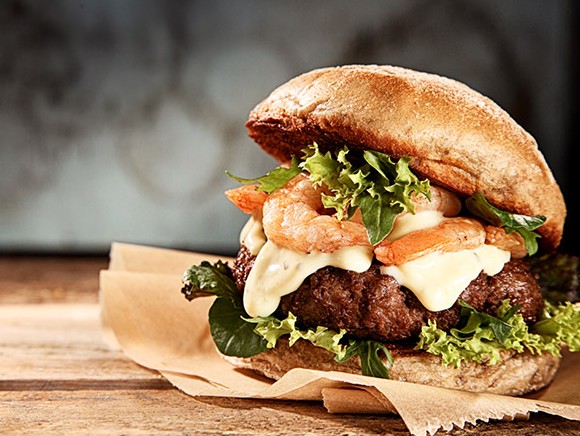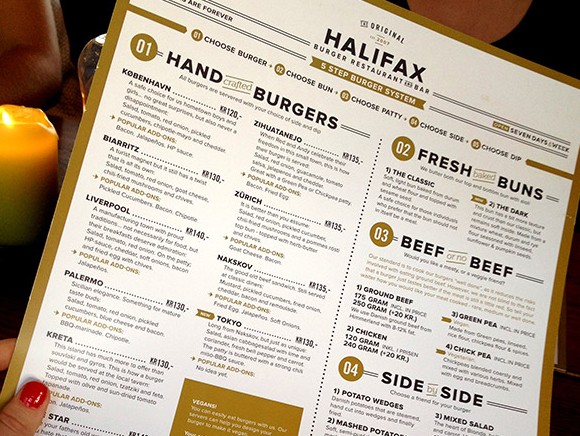
The burgers from Halifax in Denmark are tasty, classically American but certainly not old-fashioned. But before customers can bite heartily into their burgers, the various components must be safely packed for the journey from the production site to the individual restaurants.
Peter and Ulrich are the names of the two friends who founded Halifax in 2007 in the city of Copenhagen. Since that time, a lot has happened. From a good idea and a small start-up has arisen a company with several restaurants, where guests can feel comfortable, have fun and really enjoy an appetising burger in a huge range of varieties. Takeaway burgers are also available for those in a hurry.
But Halifax had to develop a strategy in order to be able to survive long-term in the fiercely competitive market. The two company founders soon realised this could only be achieved if they set themselves up seriously and professionally in all areas of the business, and if they acted in a consciously responsible way. The business philosophy and recipe for success is therefore as simple as it is ambitious: “A good product, friendly and personal service, one’s heart in the right place, and of course a lot of hard work,” as Robert Darville, Production Manager at Halifax, sums it up.
There are many different varieties of burger, but all are freshly prepared with fresh ingredients. The burger buns are freshly baked every day to a specially developed recipe, and the various dips and marinades are prepared in the kitchen in Hvidovre. They are delivered to the individual restaurants every morning as required. Recipes are continuously honed, and raw materials are carefully selected. This means that the company is in constant discussion with suppliers - and can evaluate them for quality, sustainability, transparency, stability and price.
Because Halifax is an integrated catering business, the same relaxed atmosphere is offered to every guest in each restaurant, even though the restaurants are furnished individually and with a slightly different overall impression. The customer always gets the same high quality of product from the same menu. And in all the restaurants the food is always served in the same friendly, quick and attentive manner. “Guests should always feel at ease when they are with us, like being at home - irrespective of whether they are work colleagues, or coming as a family, or have a date,” explains Robert Darville.
When the company started, the individual food portions were filled manually into small metal boxes. These were then packed into plastic containers for the journey from the kitchen to the restaurants. However, transport was expensive due to the high packaging weight, as well as often being unreliable. If the vehicle braked sharply, the food containers often tilted or fell over, losing their lids and causing the content to be wasted. The whole transport operation was cost-, time-, and resource-intensive, and definitely not a permanent solution for the growing business.
As the number of restaurants and production volume grew, a professional and efficient solution had to be found. It had to be faster and more reliable, in short it had to be automated. By the end of 2014, Halifax was looking for a long-term solution and based on recommendations, the company turned to Multivac.
Since that time, a R 126 thermoforming packaging machine has handled the packaging procedure at Halifax. With its footprint of barely 3 m², the compact machine requires very little space. Smooth and angled surfaces, easy-to-open side panels and a machine interior that is optimised for hygiene ensure the R 126 is easy to clean. The model is designed for small to medium-sized batches at a maximum of 10 cycles per minute, it can run both flexible and rigid film, and is very easy for the user to operate. The variety of standard format sets, combined with the most important options from Multivac’s range of technology, enable the R 126 to be matched individually to the particular requirements and circumstances of the production environment.
The machine packs many of the components which make a good burger. Some of these ingredients include salsa, mayonnaise, barbecue sauce and ketchup, guacamole, roasted onions, mushrooms, cucumber salad, roast potatoes and vegetarian burgers. The shelf life of the products is also determined by the packaging: in the case of the delicate guacamole, it must be 4 days, for salsa 6 to 8 days, and for mayonnaise 10 days. The packaging design was conceived in such a way, that the thermoformed packs produced on the MULTIVAC machine is capable of being placed into the metal containers without problems, and then removed later without being damaged. After they have been used, the packs are disposed of carefully.
Robert Darville regarded the greatest challenge with this project as being the task of finding a packaging machine and solution, by which all the products could be packed efficiently and cost-effectively in one pack format. “This process lasted some time, but at the end we had a future-proof solution, which meets all our daily requirements."
Another important aspect was linking the machine to a RISCO vacuum filler. The freshly prepared mayonnaise for example is first loaded into the vacuum filler and then portioned precisely into the formed pack cavities of the thermoforming packaging machine. “Using this combination of equipment, we can now operate significantly more cleanly. The packs look professional, are stable and secure, and are also easy to handle. And we also avoid waste,” adds the Production Manager.

For Halifax the investment has paid off hugely. Even though many guests in the restaurants like to eat the burgers with their hands, automation brings only benefits in the production and packaging procedure, when it comes to quality, safety, hygiene, speed and reproducibility.
Source: © Multivac